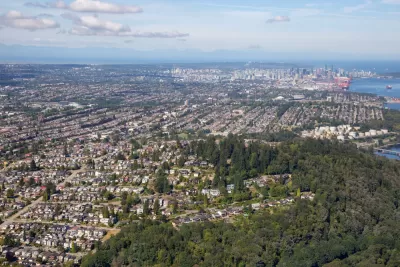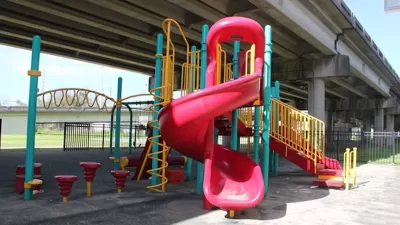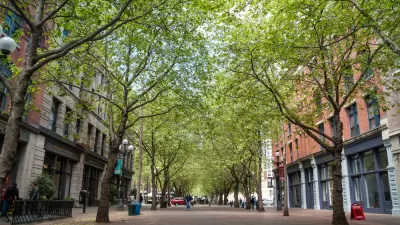Despite the well-documented impacts of traffic noise and pollution, Vancouver's housing policy effectively relegates multi-family apartment buildings to busy arterial roads.

"Instead of planning for housing options in locations that maximize the health and well-being of residents, policymakers are mandating that people who prefer more compact, energy-efficient, and lower-cost homes can only live on traffic-choked arterial streets—and must suffer all the bad health consequences," writes Daniel Oleksiuk of Vancouver's housing policy that recommends the construction of new multi-family apartment buildings on arterial roads as a "buffer" for noise and pollution. Yet research increasingly shows the detrimental impacts of exposure to traffic pollution, such as respiratory disease, cancer, and mental health impacts.
"This November, Vancouver City Council will vote on the Secured Rental Policy, a proposal to legalize six-story rental apartments on busy arterial roads and four-story rentals on the adjacent side streets." According to Oleksiuk, "[u]nless the draft Secured Rental Policy is amended to open up more of the city to multi-dwelling homes, Vancouver’s official position will remain clear: renters are fodder for protecting those fortunate enough to own detached houses on big lots."
Although some families might prefer to live on arterial streets close to public transit, Oleksiuk argues that "[t]he issue at play is one of choice: arterial streets should not be the only places where families living on lower incomes should be able to afford." With most Vancouver renters priced out of the single-family and condo markets, apartment dwellers are unfairly exposed "to the increased health risks that come from living on busy, arterial roads."
FULL STORY: CONFINING RENTAL HOMES TO BUSY STREETS IS A DEVIL’S BARGAIN

Alabama: Trump Terminates Settlements for Black Communities Harmed By Raw Sewage
Trump deemed the landmark civil rights agreement “illegal DEI and environmental justice policy.”

Study: Maui’s Plan to Convert Vacation Rentals to Long-Term Housing Could Cause Nearly $1 Billion Economic Loss
The plan would reduce visitor accommodation by 25% resulting in 1,900 jobs lost.

Planetizen Federal Action Tracker
A weekly monitor of how Trump’s orders and actions are impacting planners and planning in America.

Waymo Gets Permission to Map SF’s Market Street
If allowed to operate on the traffic-restricted street, Waymo’s autonomous taxis would have a leg up over ride-hailing competitors — and counter the city’s efforts to grow bike and pedestrian on the thoroughfare.

Parklet Symposium Highlights the Success of Shared Spaces
Parklets got a boost during the Covid-19 pandemic, when the concept was translated to outdoor dining programs that offered restaurants a lifeline during the shutdown.

Federal Homelessness Agency Places Entire Staff on Leave
The U.S. Interagency Council on Homelessness is the only federal agency dedicated to preventing and ending homelessness.
Urban Design for Planners 1: Software Tools
This six-course series explores essential urban design concepts using open source software and equips planners with the tools they need to participate fully in the urban design process.
Planning for Universal Design
Learn the tools for implementing Universal Design in planning regulations.
Caltrans
Smith Gee Studio
Institute for Housing and Urban Development Studies (IHS)
City of Grandview
Harvard GSD Executive Education
Toledo-Lucas County Plan Commissions
Salt Lake City
NYU Wagner Graduate School of Public Service





























